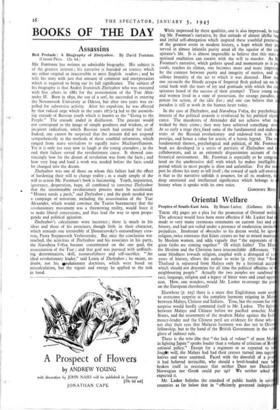BOOKS OF THE DAY
Assassins
MR. FOOTMAN has written an admirable biography. His subject is of the greatest interest ; his narrative is founded on sources which are either original or inaccessible to most English readers ; and he tells his story with just that amount of comment and interpretation which is required to bring out its full significance. The subject of his biography is that Andrei Ivanovich Zhelyubov who was executed with five others in 1881 for the assassination of the Tsar Alex- ander II. Born in 1850, the son of a serf, he. succeeded in entering the Novorossisk University at Odessa, but after two years was ex- pelled for subversive activity. After his expulsion, he was affected by that radical urge which in the years 1873-74 led to the astonish-
((,1 ing crusade of Russian youth which is known as the "Going to the People." The crusade ended in disillusion. The peasant would not correspond to the image of simple goodness and wisdom, or of incipient radicalism, which Russian youth had created for itself. Indeed, one cannot be surprised that the peasant did not respond sympathetically to the methods of these youthful reformists, which ranged from naive revivalism to equally naive Machiavellianism. Yet it is only too easy now to laugh at the young crusaders • in the end their failure served the revolutionary cause. It showed con- vincingly how far the dream of revolution was from the facts ; and how very long and hard h work was needed before the facts could be changed into the dream.
Zhelyubov was one of those on whom this failure had the effect of hardening their will to change reality ; as a study simply of the will to action Mr. Footman's book is fascinating. Youth, impatience, ignorance, desperation, hope, all combined to convince Zhelyubov that the interminable revolutionary process must be accelerated. " History needs a push," said Zhelyubov ; and the push needed was a campaign of terrorism, including the assassination of the Tsar Alexander, which would convince the Tsarist bureaucracy that the 'evolutionary movement was a threatening reality, would force it to make liberal concessions, and thus lead the way to open propa- ganda and political agitation.
Zhelyubov's calculations were incorrect ; there is much in his
ideas and those of his associates, though little in their character, which reminds one irresistibly of Dostoeyevsky's extraordinary crea- tion, Pyota Stepanovich Verhovensky. But once the conclusion was leached, the activities of Zhelyubov and his associates in his party, the Narodnya Volya, became concentrated on the one goal, the assassination of the Tsar ; and that goal was pursued with unflinch- ing determination, skill, resourcefulness and self-sacrifice. "An ideal revolutionary leader," said Lenin of Zhelyubov ; he meant, no doubt, not his iaszolutionary doctrines, which were based on
miscalculation, but the vigour and energy he applied to the task in hand.
While impressed by these qualities, one is also impressed, in r ing Mr. Footman's narrative, by that attitude of almost idyllic h and joyful self-abnegation which inspired these youthful precur of the greatest event in modern history, a hope which they p served in almost infantile purity amid all the squalor of the c spirator's life. It is almost impossible to believe that this state spiritual exultation can coexist with the will to murder. As Footman's narrative, which gathers speed and momentum as it p ceeds, reaches its climax, one becomes more and more impres by the contrast between purity and integrity of motive, and callous brutality of the act to which it was directed. How d one reconcile the bloody scraps of Imperial flesh picked up on canal bank with the tears of joy and gratitude with which the c spirators heard of the success of their attempt? These young m and women lived in a state of possession, the strange paradise, potent for action, of the idie fixe; and one can believe that paradox is still at work in the human heart today.
In the case of Zhelyubov, and Narodnya Volya, the psychologi interest of the political assassin is reinforced by his political sign cance. The murderers of Alexander did not achieve what th wished by their crime ; they may have achieved something mo At so early a stage they,fixed some of the fundamental and endu traits of the Russian revolutionary and endowed him with t. prestige, and hence a value for action, of a heroic legend. The fundamental themes,, psychological and political, of Mr. Footman book are developed in a series of portraits of Zhelyubov and collaborators, and in an extremely dispassionate account of the historical environment. Mr. Footman is especially to be congra lated on the unobtrusive skill with which he makes intelligible period which to most people is alien and unfamiliar. For the part he allows his story to tell itself ; the reward of such self-restra is that as the narrative unfolds it assumes, for all its modesty, deep emotional and intellectual significance which belongs to history when it speaks with its own voice.
GORONWY REES


























 Previous page
Previous page